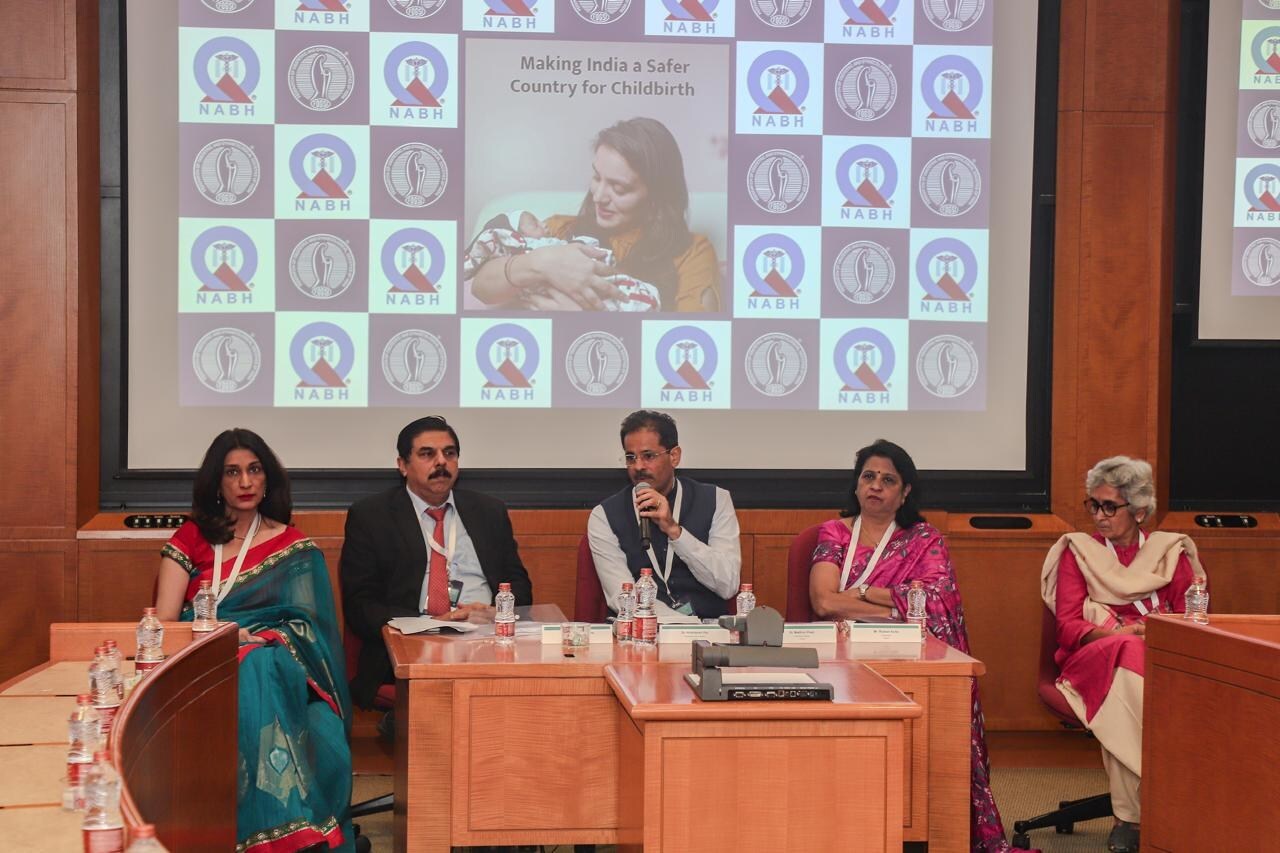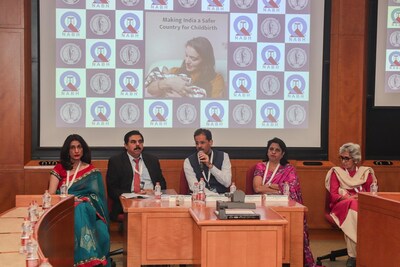 PRNEWSWIRE
PRNEWSWIRE

The MoU signed in 2022 has progressed and culminated in the subsumption of FOGSI-led Manyata initiative's 20 quality standards across NABH's Certification programs.
MUMBAI, India, Nov. 14, 2024 /PRNewswire/ -- The National Accreditation Board for Hospitals & Healthcare Providers (NABH) has integrated The Federation of Obstetric and Gynaecological Societies of India (FOGSI)'s Manyata maternal health quality standards across NABH Certification programs. This move, forms part of a strategic collaboration inked in 2022 between NABH and FOGSI, to improve the quality of maternity services and advance the Indian government's vision of 'One Nation One Standard'. By promoting standardization in maternal healthcare through the adoption of uniform standards nationwide, the collaboration will drive systemic improvements and contribute to efforts to achieve Universal Health Coverage.
Manyata is FOGSI's flagship quality improvement and certification initiative that acts as a stamp of quality ensuring consistent, safe, and respectful care for mothers during and after childbirth. It promotes the adoption of evidence-based clinical standards based on the World Health Organization's (WHO) standards of quality care in maternal health for antenatal, intrapartum, and postpartum care.
To launch the collaboration, a pilot program was conducted where 200 private maternity facilities trained on Manyata standards were assessed by NABH assessors, who were specifically onboarded and trained for this purpose by FOGSI. The pilot results showed consistent certification success rates whether facilities were assessed by FOGSI or NABH assessors. Moving forward, facilities pursuing NABH Entry-Level certification will be able to achieve dual certifications for NABH and Manyata, validating their compliance with both national healthcare standards and specialized maternity care protocols, with the NABH HOPE portal providing a digital platform for application processing and assessments. Additionally, leveraging its network, FOGSI will identify assessors who will be trained by NABH to create a dedicated pool of NABH assessors specializing in obstetrics and gynaecology.
Reflecting on the announcement, Mr Rizwan Koita, Chairman of NABH said, "Uniform standards are crucial for ensuring that every mother receives consistent care, regardless of where she delivers. By incorporating Manyata guidelines into NABH certification programs, we are not only strengthening our accreditation framework, but also setting a new benchmark for maternal health. This standardization will play a vital role in transforming maternal care across India. In addition, NABH will incorporate maternal health guidelines into NABH Digital Health Standards for Hospitals and HIS/EMR Systems engaged in mother and childcare."
Dr. Madhuri Patel, Secretary General, FOGSI said, "With 1.3 million Indian women having lost their lives to maternal causes over the past two decades, and despite a 70% overall decline in maternal mortality rates, there is a need to accelerate the progress. To achieve the UN's 2030 Sustainable Development Goals and realize universal health coverage, we must deepen our resolve to bolstering healthcare systems. By harnessing the power of collaborations we can standardize care protocols, improve service delivery, and create sustainable solutions that enhance maternal healthcare accessibility."
Dr. Hrishikesh D. Pai, Trustee, FIGO Asia Oceania, Immediate Past President, FOGSI, and Chief Administrator, FOGSI-Manyata initiative, remarked, "The collaboration between FOGSI and NABH represents a pivotal step towards fostering a culture of excellence, accountability, and patient-centric care in the private healthcare sector. We are dedicated to building on this success and broadening the impact of the initiative. It will not only encourage wider adoption of best practices but also forge a path towards a future where every childbirth experience is safe, supported and dignified."
Dr. Rishma Pai, Former President, FOGSI said, "By embedding Manyata's comprehensive protocols into NABH's certification guidelines, we aim to create a robust, unified system that elevates the quality of maternal care across the board. Expanding access to quality healthcare and standardizing the care delivered is not merely a goal but a moral imperative-one that will ensure the safety of every mother and child who visit these facilities."
Preventable maternal deaths continue to be a significant concern in India. The announcement promises a welcome step towards addressing the issue. Establishing standardized care protocols in the healthcare sector is critical to enhance the delivery of maternal care in India, helping achieve better health outcomes.
Additional quotes from key stakeholders, who are not present in the room but have shared their perspectives, are included below:
Dr. Atul Mohan Kochhar, CEO of NABH said, "The integration of Manyata's standards into our accreditation process marks a transformative step toward enhancing safe maternal healthcare. This collaboration allows us to align our efforts with FOGSI's expertise, ensuring that accredited hospitals meet comprehensive maternal health protocols. Our aim is to create a sustainable model for quality accreditation that benefits mothers and newborns nationwide."
Dr. Hema Divakar, National Convener, FOGSI-Manyata initiative said, "This announcement reflects FOGSI and NABH's shared vision of ensuring that every mother, regardless of her circumstances, receives the compassionate and exceptional care she deserves. Through a joint Technical Working Group, with members from FOGSI and NABH, we are working to streamline the quality standards to ensure they represent an ideal blend of infrastructure and labor room compliance, serving the best interests of mothers and newborns. This strategic alignment not only reinforces our commitment to patient safety and clinical excellence but also highlights the benefits of a unified approach to delivering high-quality, standardized care."
About The Quality Council of India (QCI)
Quality Council of India (QCI) was established as a National body for Accreditation on recommendations of Expert Mission of EU after consultations in Inter-ministerial Task Force, Committee of Secretaries and Group of Ministers through a Cabinet decision in 1996. Accordingly, QCI was set up through a PPP model as an independent autonomous organization with the support of Government of India and the Indian Industry represented by the three premier industry associations, (i) Associated Chambers of Commerce and Industry of India (ASSOCHAM), (ii) Confederation of Indian Industry (CII) and (iii) Federation of Indian Chambers of Commerce and Industry (FICCI).
About National Accreditation Board for Hospitals and Healthcare Providers (NABH)
National Accreditation Board for Hospitals & Healthcare Providers (NABH) is a constituent board of Quality Council of India, set up to establish and operate accreditation programme for healthcare organisations. The board is structured to cater too much desired needs of the consumers and to set benchmarks for progress of health industry. The board while being supported by all stakeholders including industry, consumers, government, have full functional autonomy in its operation.
About The Federation of Obstetricians and Gynaecological Societies of India (FOGSI)
The Federation of Obstetric and Gynaecological Societies of India (FOGSI) is the professional organization representing practitioners of obstetrics and gynaecology in India. With 275 member societies and over 43,011 individual members spread over the length and breadth of the country, FOGSI is probably one of the largest membership-based organizations of specialized professionals. FOGSI exists to encourage and disseminate knowledge, education, and research in the field of obstetrics and gynaecology, to pilot and promote preventive and therapeutic services related to the practice of obstetrics and gynaecology for the betterment of the health of women and children in particular and the wellbeing of the community in general, to advocate the cause of reproductive health and rights and to support and protect the interest of practitioners of obstetrics and gynaecology in India.
About Manyata
Manyata is FOGSI's flagship initiative to improve the quality of private maternity care for women in low- and middle-income categories in India. This initiative is supported by MSD for Mothers. It is a quality improvement (training) and certification program that acts as a stamp of quality ensuring consistent, safe, and respectful care for mothers during and after childbirth. The program promotes the adoption and practice of 20 clinical standards in line with World Health Organization (WHO) standards for antenatal, intrapartum, and postpartum care. Currently, Manyata is present in 25 states/UTs with planned expansion to other states. In Maharashtra, the program runs as a joint initiative between the Public Health Department, Government of Maharashtra and FOGSI, and is called LaQshya-Manyata with additional 10 Facility standards in line with national standards of care.
The initiative is led by Dr. Hema Divakar, National Convenor Manyata; Dr. Hrishikesh Pai, Trustee, FIGO Asia Oceania, Chief Administrator, FOGSI-Manyata Initiative; and Dr. Ameya Purandare, Deputy Administrator, FOGSI-NPMU and managed by Dr. Samita Bhardwaj, National Program Manager, FOGSI-NPMU. The National Program Management Unit (NPMU) constituted under FOGSI is responsible for quality assurance, training of trainers and accreditation of lead assessors, who evaluate private facilities on standards and recommend them for certification. In Maharashtra, this assessment is jointly undertaken by FOGSI and Public Health Department, Government of Maharashtra.
Photo: https://mma.prnewswire.com/media/2557964/FOGSI_MATERNAL_HEALTH.jpg
![]() View original content to download multimedia:https://www.prnewswire.com/in/news-releases/nabh-integrates-fogsis-maternal-health-standards-across-its-certification-programs-302305622.html
View original content to download multimedia:https://www.prnewswire.com/in/news-releases/nabh-integrates-fogsis-maternal-health-standards-across-its-certification-programs-302305622.html




